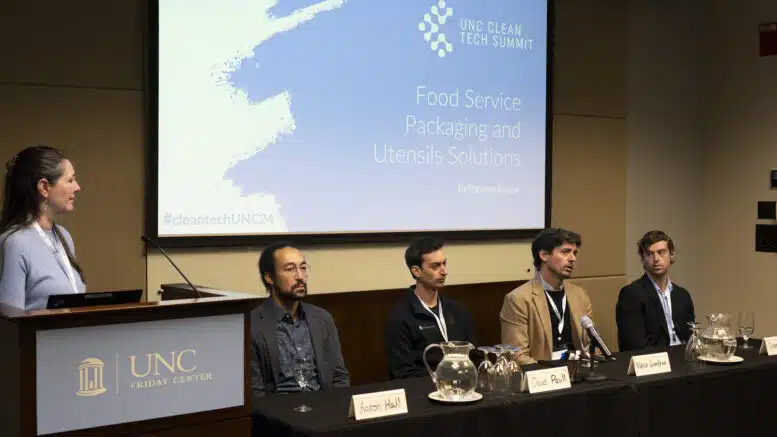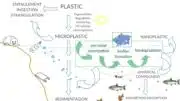By Will Atwater
North Carolina’s reliance on single-use plastics is a problem.
Plastic shopping bags, utensils, straws, to-go trays and over-the-counter medicine packaging are staples of modern society, but these conveniences come with a steep cost.
Fossil fuels used in the production of these items contribute to greenhouse gas emissions, warm the planet and contribute to pollution, according to a recent study.
And all this plastic is ending up inside us too. A 2019 study commissioned by the World Wildlife Fund found that humans digest roughly 5 grams, or a credit-card size amount, of microplastics weekly. While there is no consensus on whether there is a link between microplastic ingestion and human diseases such as inflammatory bowel disease and hormone dysfunction, research is underway.
Decisions made on the individual level, like purchasing a reusable water bottle, cloth shopping bag or an electric vehicle, can help reduce the plastic load, but some argue that we need bigger, macro-level changes at this point.
That’s why leaders of Don’t Waste Durham — an organization that describes itself as creating solutions that prevent trash — feel like it’s important to establish a so-called circular economy.
“If you extract materials from the earth, use them for like 10 minutes on average and then throw them away— that’s not sustainable,” said Sydney Harris, policy director for Upstream, an organization working to eliminate waste by advocating for a transition from a single-use to a re-use system. “I don’t care what material it is.”
Crystal Dreisbach, former executive director of Don’t Waste Durham and current CEO of Upstream, said in a 2023 interview that “reuse and a reuse system infrastructure is the solution […] to our single-use plastic crisis and the global climate crisis.”
Hence the need for an economy that keeps “materials, products and services in circulation for as long as possible” to slow climate change, according to a definition created by the Environmental Protection Agency. If people produce fewer single-use materials, such as plastics, less CO2 emissions will enter the atmosphere.
Daunting logistics
Before joining Upstream, Dreisbach spent more than a decade establishing initiatives in the City of Durham while leading her former organization. In 2017, Dreisbach helped launch GreenToGo, a reusable container system that customers of participating restaurants and food establishments can use to take home food instead of using a plastic or styrofoam container. Later, the reusable containers are dropped off at one of the return centers, where they are collected, washed and returned to food vendors by a member of the GreenToGo staff. Food vendors pay a fee for the service.
Dreisbach would like to see this system add more food vendors across the city, to include public schools and concessions at sports venues like the Durham Bulls’ stadium, which seats 10,000 fans.
To serve that many clients, Don’t Waste Durham would need to establish a commercial wash center large enough to handle the increased volume of dishes. Finding funding for a commercial wash center has been daunting for the organization, said Dreisbach, who is now a senior advisor for her old organization.
She argued that a commercial wash center would boost the local economy by adding jobs and would reduce the amount of waste going to landfills, like the one in Sampson County that has become a bone of contention for residents there.
Campuses show closing the loop is possible
University groups in other parts of North Carolina are also working toward a sustainable future.

Credit: Appalachian State University Office of Sustainability
Appalachian State University credits its Zero Waste initiative as the reason 28,000 pounds of waste collected during home football games was diverted from local landfills in 2023 “through compost and recycling efforts,” according to the university’s sustainability website.
Jennifer Maxwell, university sustainability program director, said getting to this point took a sustained commitment.
“Over the years, we’ve tried to transition to compostables … and also bring back more focus to reusables because that’s much more desired than disposables. But you’re not going to give 30,000 people china[ware] in a football stadium, so you’re gonna have disposables here and there.”
Maxwell said her department has developed a partnership with campus dining.
“They’re using reusables in our main takeout locations, and they’re purchasing compostables and transitioning away from single-use plastics altogether.” She also said that campus stores have moved away from plastic bags and transitioned to paper. Additionally, as part of the “skip the bag” program, money that would have gone to cover the cost of a bag used at checkout is donated to a charitable cause.
Lanie Karstrom, sustainability outreach coordinator at the university, said diverting compostable and recyclable materials produced at football games from winding up in landfills is an ongoing challenge.
“We’ve had as high as 72 percent diversion, and we’ve also had as low as 53 percent,” Karstrom said. “Where the discrepancy comes from has a lot to do with the fan base […] and the athletic engagement teams, who are handing out giveaways like nonrecyclable cups and merchandise. It’s not something we have a lot of control over.”
Maxwell and Karstrom hope to forge a stronger relationship between the sustainability program and the athletic department, which is in charge of its own concessions and purchasing program.
Universities leading the way
The Cleantech Summit, hosted in March at UNC Chapel Hill’s Friday Center, previewed what could become a standard conference offering: food served on washable dining ware and reusable placards for panelists’ names.

Melanie Elliott, sustainability analyst for Sustainable Carolina, a UNC Chapel Hill program focused on advancing the university’s sustainability goals, said there is one big reason why reusable wares were prominent at the summit.
“The Friday Center has a full kitchen inside the facility, including a dishwasher, so they have the capability of using nondisposable flatware and dinnerware because they have that equipment in house,” Elliott said.
Though not all conferences take place in venues that have a full kitchen and dishwasher, Elliott said there’s another way for organizers to limit reliance on single-use dining ware.
“You can utilize … registration costs to cover not just the venue, but also the catering and any additional costs that might come up to make the event more sustainable.”










